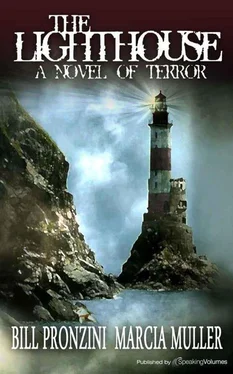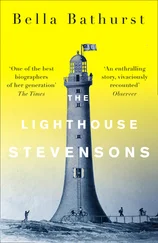True, Jan had remained in love with her, hadn’t tired of her or outgrown her. But sometimes she wondered just how much good she really was to him. There was a dark, brooding side to his nature that she didn’t really understand and in which she couldn’t share; there were problems he encountered with which she couldn’t help. If she had experienced more, lived more, felt more, wouldn’t she have grown in step with him? Or was she one of those people who were condemned to forever exist in the shadowland between childhood and adulthood?
Weighty questions, Ryerson, she told herself. Too weighty to be thinking about tonight. Fussy domesticity suddenly seemed a better subject, and she began to contemplate the rest of their living quarters.
They were habitable enough. No, she might as well be fair: they were more or less comfortable. Along with the kitchen, cloakroom, and pantry, the ground floor was comprised of the living room and one large bedroom. The bedroom had two good-sized windows facing seaward, and since it offered the most natural light, they had agreed she should use it as her studio. The second floor consisted of a bathroom and two bedrooms-the largest of which they would sleep in, the other use for Jan’s study. Above that, built into a bubble-like niche in the tower, was the lightroom, where the keepers had stored cleaners, polishes, and supplies for servicing the light. There was even a barrel of sand in there, for use in the event of fire.
One drawback was the small hot water heater-only thirty gallons, barely enough for one of Jan’s protracted showers-but that wouldn’t be a problem. She’d taken cold showers for years, had gotten to like them when they’d been living on the back of Beacon Hill in Boston, in a building that lacked heat of any kind, including hot water. But the main drawbacks to the rooms and their arrangement were the drab white walls, their chilliness-small propane heaters were the only source of warmth in the bedrooms-and the enclosed inner stairway that took up part of the living room and led upward to the second floor and then through the tower into the lantern room. But she felt she could live with all of these too. If the dingy white color in the bedrooms and living room became too oppressive, she could always talk Jan into helping her paint them, along with the kitchen.
She finished drying the supper dishes-she and Jan had always taken turns with the domestic chores-and glanced up at the ceiling and thought again that she would have to get out the Ajax and 409 and see how much of that accumulation of grime would come off. But not tonight. She was so tired her legs felt achey. Some preliminary cleaning; Bonner was not much of a housekeeper. Unpacking. Finding places for things, rearranging other things. Making up the four-poster bed; setting out towels. And she had only just scratched the surface. A move like this was no summer vacation lark; it was a transplanting of an entire household, the same sort of upheaval you went through when you made a permanent move.
She thought of their big mock-Tudor house in Palo Alto and wondered when she would see it again. Not until Christmas, at the earliest- if they decided to go home for the holidays. But the house was in good hands: her cousin June was dependable and conscientious-you couldn’t ask for a better house-sitter.
Alix went into the empty living room. Jan had gone upstairs after supper; she wondered what he was doing. Whatever it was, he was being quiet about it. Curiosity took her up to the second floor. In the hallway that skirted the curve of the tower wall, she called his name. But he wasn’t in their bedroom or in his new study; his answer came echoing down from above.
“Up here. In the lantern.”
She went back to the stairs. The hollow of the tower was like a speaking tube: from the lower floors you could hear clearly when someone spoke from the lantern room in a voice not much louder than normal, and the same was true vice versa. Not even the constant muttering of the wind affected the acoustics inside.
The two flights of stairs leading up to the lantern were steep, creaky, and worn to a shine in the center of each riser. Just above the second-floor landing you had to pass through a metal trapdoor, hinged open and fastened that way with a hook; the reason for the trap, Jan had said, was so that men working in the lightroom and the lantern above wouldn’t disturb their family members below. A pair of low-wattage electric bulbs, one on the wall halfway up each flight, did little to dispel the damp gloom. Climbing, she thought it was a good thing neither of them would have to do this every day-Jan especially, with the extra weight he was carrying. She wondered again if she could get him to diet while they were living here. Probably not. Well, maybe she could at least talk him into doing aerobics with her. She had started working out a couple of years ago, after her second miscarriage, and had kept it up because she knew it was good for her, kept her own weight down. And it was better than tennis or racquetball, the big “in” sports back home, neither of which she had ever been any good at. Too uncoordinated: all arms and legs, with an uncanny knack for stumbling over her own feet. Anyhow, lifting a book was the second most strenuous exercise Jan ever indulged in. “I’d prefer to have my heart attack screwing or reading quietly in a chair,” he’d said more than once. A sedentary Viking…
There was a three-foot-square opening in the floor of the lantern room, but no trapdoor there. Dusky light showed above it; it must be about eight, close to dark outside. She climbed through the opening. Yes, almost nightfall. Through the lantern windows she could see that the sun had set and there were hints of violent reds and purples among the clouds massed on the horizon.
Jan was on his hands and knees to one side of the massive light, using a flashlight to do something she couldn’t see. He said, “Be with you in a minute,” in a distracted voice.
She moved closer to the light. It fascinated her-its size, its intricate construction. A First Order Fresnel, Jan had told her, built in Paris in 1872 by the firm founded by Augustin Fresnel some fifty years earlier. A beehive of glass prisms set in brass-more than a dozen bull’s-eyes, around which other triangular prisms were placed-it measured fourteen feet in height and six feet in diameter, and weighed better than three thousand pounds. The hand-polished prisms were capable of taking all the light that struck the inside surfaces of the glass and redirecting the rays into one flat beam that could be seen more than twenty miles at sea. The lenses were rotated by hand-wound clockworks powered by means of a descending weight. It was the clockworks, she saw, that Jan was examining with his flashlight.
The huge lens took up most of the space in the lantern room. The enclosure was decagonally shaped, each of its sides constructed of heavy iron-plate for the bottom two and a half feet, then of window glass some thirty inches by thirty-six inches set in narrow metal sashes topped by six incbes of metal. The metal parts and the floor were painted a dark red color, faded and peeling now in places; the window sashes were a dull white, as was the domed ceiling. On the north side, set into the metal a few inches above the floor, was a door that reminded Alix of an oversized pet-door. This led out onto the catwalk-a railed metal deck three feet wide and built at a slight downward angle, so as to shed rainwater. The thought of having to walk about out there, exposed and unprotected sixty feet above the ground, with that harsh wind pummeling her body, gave Alix a sharp pang of vertigo. She didn’t mind heights when she was enclosed like this, or up in an airplane; but out in the open, where one false step could send you plummeting… no, thank you.
Читать дальше












